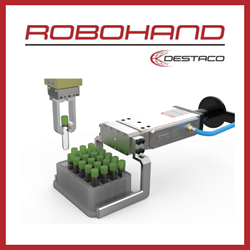Heriot-Watt and Edinburgh Universities Secure Funding for Robotics, Autonomous Systems Research
Heriot-Watt University and the University of Edinburgh have jointly secured 6 million of UK government funding for research into robotics and autonomous systems.
The funding is part of a wider 85m investment in three technological areas identified in the pre-budget statement by The Chancellor of the Exchequer as part of the government's 'eight great technologies' to drive UK growth.
Speaking at the Global Intelligent Systems conference in London, David Willetts, Minister for Universities and Science, announced the results of a call for proposals issued by the Engineering and Physical Sciences Research Council (EPSRC).
Funding will be made available to more than 20 universities across the UK to support and strengthen existing research in the areas of Robotics and Autonomous systems, Advanced Materials, and Grid-scale energy storage.
Minister for Universities and Science, David Willetts said: "For Britain to get ahead in the global race we have to back emerging technologies and ensure our universities have the latest equipment. This capital investment will help scientists make new discoveries and take their research through to commercial success. It will drive growth and support the Government's industrial strategy."
International hub for robotics research
Heriot-Watt University and the University of Edinburgh have jointly secured the largest investment of any Scottish universities and the largest single investment to robotics and autonomous systems, more than the University of Oxford and University College London combined.
Professor David Lane from Heriot-Watt University said, "This funding will enable us to develop a world-leading research base in robotics and autonomous systems, which is estimated as a new €15.5 billion global market and a major opportunity for the UK economy.
"Robotics has the potential to create breakthroughs in oil and gas, manufacturing, search and rescue, defence and environmental monitoring.
"There are wider societal gains too. Autonomous robots could be deployed in to elderly people's homes to assist users in their everyday tasks, for example. Also, we'll advance the capabilities of prosthetic limbs.
"With our partners from the University of Edinburgh, we will draw on the expertise of over 50 investigators working in 16 research groups and institutes co-located in the city, making the capital a global leader in the field."
Prof Dave Robertson, Head of School of Informatics at the University of Edinburgh, said: "This new centre builds upon Edinburgh's reputation as an international hub for robotics research and prepares us for new challenges where humans and robotic systems must work together."
The investment will underpin key sectors for the UK economy, including automotive, manufacturing, aerospace, energy, and healthcare.
Professor David Delpy, EPSRC Chief Executive said: "The successful bids will build capability in areas that are vital for the country and where exciting research is already being carried out. Developing new ways to storing energy, creating new materials for manufacturing and other industries, and increasing our understanding of how autonomous systems communicate, learn and work with humans."
Source: http://www.hw.ac.uk/
Featured Product

DESTACO - Revolutionizing Industrial Automation
Looking for a reliable solution to enhance your automation process? Look no further than the DESTACO Robohand Grippers. These grippers are designed for the modern world of robotics, offering unparalleled performance and precision. Whether you need to grip fragile items, irregularly shaped objects, or heavy-duty components, the DESTACO Robohand Grippers have got you covered. Their modular design allows for quick and easy customization, ensuring a perfect fit for your application.
